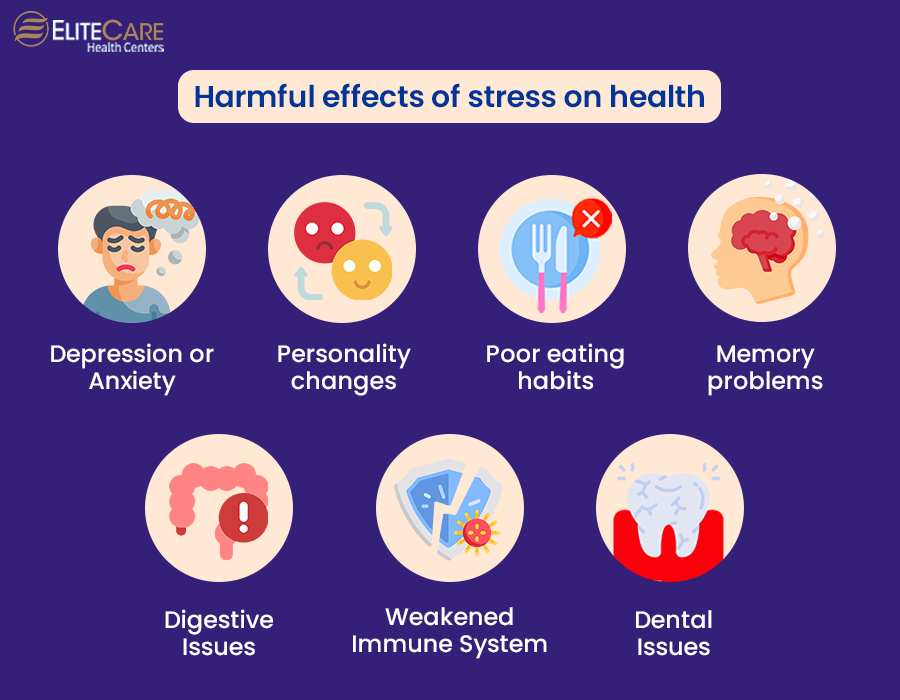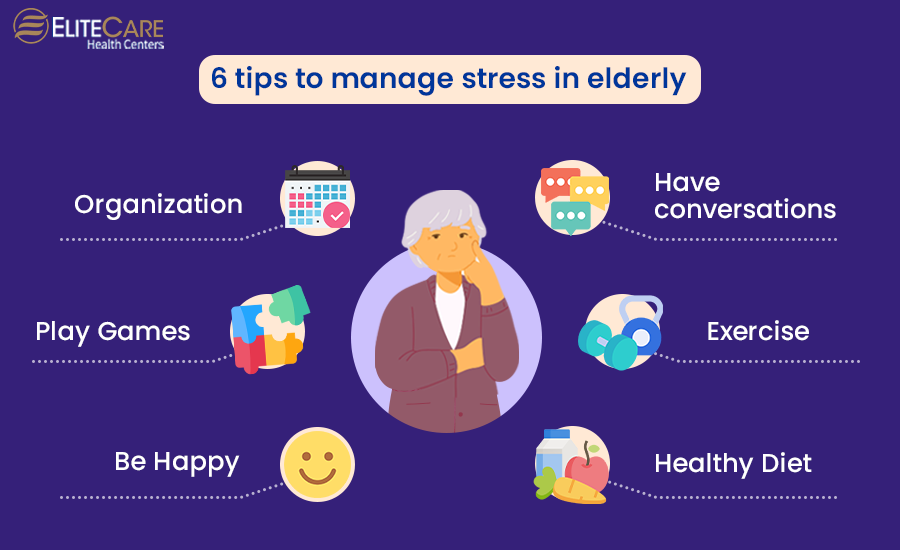
Stress is part of life, but it can affect the elderly in many ways – some of which may create challenges. With age, the body’s ability to adapt to stress declines and it should come as no surprise that stress can be dangerous for older people both physically and mentally, especially since they may be dealing with chronic illnesses and related issues.
Why are seniors stressed?
The effect of stress can vary from person to person, ranging from life stresses like having diseases, and dependency. Common stresses for the old include:
- Isolation
- Experiencing changes in relationships.
- Losing control of physical abilities.
- Increase in health care costs
- Experiencing the loss of a loved one
How does stress affect health?

Stress frequently shows itself in older adults. Common side effects of stress include frequent headaches, sleep issues, insomnia, exhaustion (both physical and mental), difficulty concentrating, changes in appetite, muscle tension, discomfort, chest pain, stomach upset, or stress. Therefore, if a person already has some chronic health issues, they won’t be able to figure out whether the stress is caused by an illness. Chronic stress can also worsen existing health conditions including diabetes, high blood pressure, and heart disease. People who are under a lot of stress are more likely to get the flu or the common cold, and immunizations tend to work less well on them.
Depression or Anxiety
Seniors already have a higher incidence of depression than the general population. Stress can have a negative impact on the quality of a senior’s life. Therefore, it is important to talk to loved ones about worries and come up with solutions. Therapy has proven helpful in these situations of extreme stress and sadness.
Read more: How to Identify Mental Health Problems in the Elderly
Personality changes
Agitation and anxiety are two conditions that frequently worsen with age and might result in observable personality changes. The main causes of abrupt or major changes in personality are memory loss and cognitive decline. These conditions affect the brain resulting in a lack of inhibition or even childlike behavior in elderly people.
Poor eating habits
Elderly people frequently overeat emotionally because they use food as a consolation while they deal with loss, loneliness, and aging. While some older people struggle to keep a healthy weight, many elderly people overeat emotionally. Meanwhile there are also cases where older folks find eating difficult or eat very small portions at a time. A sudden loss of appetite is a serious concern and should be conveyed to a doctor or wellness center immediately. Elderly loved ones’ eating habits should be closely monitored by family caregivers so that both their physical and emotional needs are satisfied.
Memory problems
People who experience high levels of stress are more likely to develop certain varieties of dementia, such as vascular dementia and Alzheimer’s disease. This is because the cardiac problems brought on by stress can affect the brain or prevent neurons from receiving the nutrition and oxygen they require.
Digestive Issues
Stomach muscles contract when stress sets off the body’s fight-or-flight reaction, which can make seniors sick. Stress can also worsen digestive problems including acidity, irritable bowel syndrome, or ulcers.
Weakened Immune System
Dental Issues
Seniors start to face a plethora of dental issues as they age. Tooth decay, gum diseases, and teeth loss are the most common diseases reported. When people experience stress, they may accidentally grind their teeth throughout the day as a result of clenching their jaw during that time.
6 tips to manage stress in elderly

There are a number of activities seniors may perform at home to help them relax and reduce their stress.
1. Have conversations
It is common knowledge that holding things inside causes unhealthy stress and pressure.
Making new friends is one definite way of enhancing one’s happiness, according to Psychology Today. Social interaction boosts feelings of well-being and lowers symptoms of depression. Therefore, it’s beneficial for seniors if they share their experiences – pleasures and sorrows, the things that irritate and anger them, and even the ordinary things that happen every day with intimate people.
Finding those with whom they share interests may be challenging for some, especially seniors who have lost friends to illness or death. It is advisable to foster relationships among the elderly. This is a fantastic method of stress reduction. Here are a few tips to communicate better with seniors:
- Make time to be there with the person
- Make communication easy
- Listen actively
- Bring in a senior companion
2. Exercise
Taking part in physical and mentally stimulating exercises can also reduce seniors’ stress. Exercise releases endorphins, which are natural painkillers, aid in sleep, and relieve tension.
Mental exercises like crossword puzzles, word searches, or even the aforementioned conversation with family and friends can keep the mind active and improve neural pathways, boosting a senior’s sense of self-worth, well-being, and pleasure.
3. Healthy Diet
A balanced diet can significantly lower stress levels. As we age, our muscles, bones, organs, and other body parts (including the brain) frequently become weaker and less efficient. Eating the right foods can help the body function more efficiently.
Certain nutrients like iron, zinc, copper, iodine, selenium, vitamin A, choline, and folate are crucial for the brain’s normal function. Brightly colored foods like fruits, leafy greens, fish, and nuts can keep the mind sharp as we age, and eating well-balanced meals gives you more energy and even makes you look better, which raises your self-esteem.
Read More: Can Certain Food Improve Your Brain Health?
4. Organization
Consider putting in place an organization system. The numerous changes and differences in their lives can be the cause of many of the pressures that older people experience. Check out these useful tips to build organization in the elderly:
- Consider making a chart with checkboxes for medicine dosages and times.
- Find elder care products that make daily tasks easier
- Maintain a Health Journal
- Maintain a Dedicated Calendar
- Be aware of your loved one’s potential future needs.
5. Play Games
Seniors can take a break from their worries by playing games. Brain games such as trivia, quizzes, and board games can help reduce stress in seniors. Elders who play interactive games can expand their creativity and strengthen their cognitive abilities.
6. Be Happy - Smile!
Stress may affect every aspect of who we are, including how we look and how we feel. Not only does smiling help us avoid appearing exhausted, worn out, and overburdened, but it can also actually reduce stress. Whether you feel like smiling or decide to fake it, smiling can actually lower stress.
Summing it up
Unfortunately, stress is unavoidable at any stage of life, and seniors are no exception. But with some healthy living tips like the ones listed above, we can look forward to providing the elderly in our lives with the contented and stress-free life they deserve.






